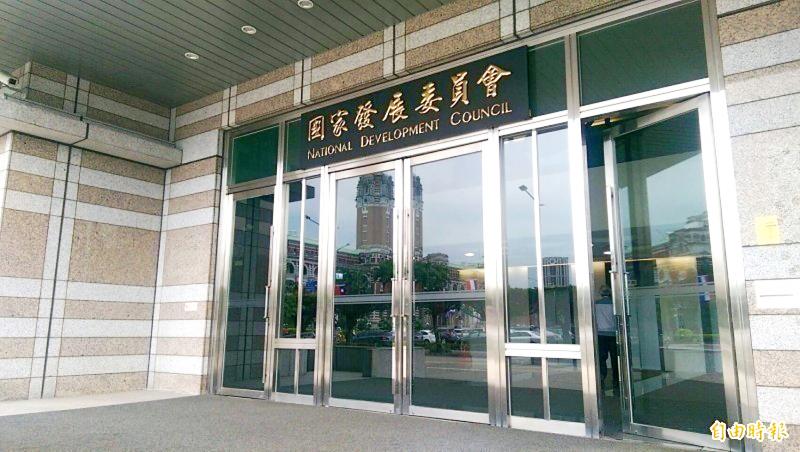Taiwan’s GDP could expand more than 4 percent this year on the back of strengthening exports, private investment and consumer spending, despite lingering uncertainty due to the COVID-19 pandemic, the National Development Council (NDC) said in a statement on Wednesday.
The projection came three days before the Directorate-General of Budget, Accounting and Statistics (DGBAS) is to update its growth figures tomorrow, after a forecast in November last year of a 3.83 percent pickup.
Exports last month spiked 36.8 percent year-on-year and are likely to expand by 3 to 8 percent this month, despite the week-long Lunar New Year holiday, the Ministry of Finance said last week.

Photo: Taipei Times file photo
The DGBAS forecast a 5.2 percent increase in exports this quarter, but the actual showing could prove twice as strong, the ministry said.
Demand for electronics used in smartphones, laptops, TVs and other technology products remains strong worldwide, as countries are expected to emerge from the COVID-19 crisis in the second half of the year, the NDC said.
Four percent growth would be stronger than most other economies, the council said, adding that the target can be reached if the government presses ahead with efforts to help companies upgrade, and guides idle funds from the private sector to infrastructure projects and business start-ups.
The government is considering removing restrictions in the insurance industry to give life insurance companies more financial incentive and greater flexibility to invest in social welfare ventures and public works projects, the council said.
It would also expand the cap for angel funds from NT$2 billion to NT$5 billion (US$70.6 million to US$176.49 million) to help groom local start-ups, it said.
The government also aims to team up with local lenders to create a financing mechanism that would provide NT$100 billion of loans for green ventures, the council added.
Meanwhile, electronics supply chains might continue to realign, driving local companies in foreign countries to move manufacturing facilities for high-end products back to Taiwan, the council said.
The migration would increase well-paid job opportunities and bolster private investment, it said.
Research bodies at home and abroad are forecasting GDP growth of 3.2 percent to 4.3 percent in Taiwan this year, the council said.
Vaccination against COVID-19 would allow the world to recover from the pandemic later this year, the council said, adding that it is closely monitoring how vaccination efforts unfold.

South Korea’s equity benchmark yesterday crossed a new milestone just a month after surpassing the once-unthinkable 5,000 mark as surging global memory demand powers the country’s biggest chipmakers. The KOSPI advanced as much as 2.6 percent to a record 6,123, with Samsung Electronics Co and SK Hynix Inc each gaining more than 2 percent. With the benchmark now up 45 percent this year, South Korea’s stock market capitalization has also moved past France’s, following last month’s overtaking of Germany’s. Long overlooked by foreign funds, despite being undervalued, South Korean stocks have now emerged as clear winners in the global market. The so-called “artificial intelligence

NEW IDENTITY: Known for its software, India has expanded into hardware, with its semiconductor industry growing from US$38bn in 2023 to US$45bn to US$50bn India on Saturday inaugurated its first semiconductor assembly and test facility, a milestone in the government’s push to reduce dependence on foreign chipmakers and stake a claim in a sector dominated by China. Indian Prime Minister Narendra Modi opened US firm Micron Technology Inc’s semiconductor assembly, test and packaging unit in his home state of Gujarat, hailing the “dawn of a new era” for India’s technology ambitions. “When young Indians look back in the future, they will see this decade as the turning point in our tech future,” Modi told the event, which was broadcast on his YouTube channel. The plant would convert

‘SEISMIC SHIFT’: The researcher forecast there would be about 1.1 billion mobile shipments this year, down from 1.26 billion the prior year and erasing years of gains The global smartphone market is expected to contract 12.9 percent this year due to the unprecedented memorychip shortage, marking “a crisis like no other,” researcher International Data Corp (IDC) said. The new forecast, a dramatic revision down from earlier estimates, gives the latest accounting of the ongoing memory crunch that is affecting every corner of the electronics industry. The demand for advanced memory to power artificial intelligence (AI) tasks has drained global supply until well into next year and jeopardizes the business model of many smartphone makers. IDC forecast about 1.1 billion mobile shipments this year, down from 1.26 billion the prior

People stand in a Pokemon store in Tokyo on Thursday. One of the world highest-grossing franchises is celebrated its 30th anniversary yesterday.